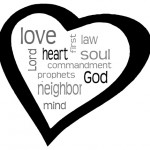Guest Blogger: Let’s go to the show!
I’ve invited several people to write “guest blog posts” for this blog. There are several reasons for this: 1) To offer different perspectives. 2) To generate even more discussion and conversation between blogs. 3) To introduce other bloggers to my readers.
(If you are interested in writing a guest blog post, please contact me at aknox[at]sebts[dot]com.)
Today’s post was written by John (as was yesterday’s post). You can connect with John on Facebook or email him at jnotestein [at] aol [dot] com.
————————————-
Let’s go to the show!
I went out early this morning to grab a cup of my favorite latte, catch up on my newspaper reading and then hit the library to check out a few new books. Then I met my wife for lunch at the nearby café before hitting the gym for a good workout and a quick pilates class. Then I met my wife for a quick dinner and movie, followed by an awesome concert by a kickin’ band. And I did all of this in the confines of a local church.
Well, not really, but you get the idea. As a Christian these days, we can live the Amish life without the dark clothes and hats. We can easily live our lives outside of work wrapped in the comfortable cocoon of Christian community. So what of it, you say?
Christian community is very important to me. I see no other way to grow in my faith than to live my life in community with other believers. But what do we do with that faith?
But I’m getting ahead of myself. First of all, I first started attending church 9 months before I was born. I have always been in SBC affiliated churches, and went through every children, youth, and adult program that came down the pike (I still have Sunbeam songs in my head, so you can kinda tell my age group). I have sat through the spring/fall revival services and have lots of gold stars on old VBS certificates. I was even there in our old country church the day the organ arrived (what was wrong with the piano?) and a few folks thought this was the pathway to liberal mainline decline.
What a difference a few decades make. These days you might be hard pressed to find an organ (it’s over behind the drum kit). Now, if you think this post is about worship styles, you’re wrong. I have seen the extremes in styles, at least in the SBC world, and have never failed to worship our God and Savior because of the type of music. No, this post is about something that is a little more subtle: who are we really worshiping?
Well, God, of course, I can hear you say. But sometimes I feel as if I’m at an American Idol audition rather than a worship service. I don’t have to participate; I just have to listen as part of the audience. And for you younger guys, it’s not the music. I have attended my youngest daughter’s church many times and their music stands above just about anything I hear that is called contemporary worship music. The difference is: I’m singing along with them. I’m praising my Lord. I am actively worshiping. I’m not sitting in a Branson show.
Anyway, that’s not really what I wanted to talk about anyway (it’s my lead in). Where and how do we truly worship God? I contend that I worship more at times when I sit in the coffee shop with my Christian brothers and sisters, or hand out meals at the City Union Mission, or work with my non believing coworkers and neighbors. As Christians, we are all living our faith daily. As we engage with God’s world, we are testimonies to our faith. I am not saved to wait and sit in the bus station waiting for the 4:55 to Heaven. God is not part of my life for several hours on a Sunday morning. He owns me. I was bought at a price. Everything I do reflects His mercy to me. And not just towards me. Everyone and everything I come in contact with. I am a tool in the Master’s hands. If you think like that, you can’t help but worship. All of life is worshiping the Creator.
Or do you not know that your body is a temple of the Holy Spirit within you, whom you have from God? You are not your own, for you were bought with a price. So glorify God in your body. (1 Corinthians 6:19-20 ESV)
The same things I tell my kids I need to repeatedly tell myself. It’s not about me. It’s about my God and Savior.
Worship, Jesus Christ, and Gathering with the Church
Several years ago, when I was still in the middle of my MDiv studies at Southeastern, two books in particular were very influential on me. The books were not necessarily influential on my thoughts and understanding about God or the church. Instead, these two books and authors helped me realize that it was possible to present what I was learning about the church in an academic or scholarly manner.
Those two books were Paul’s Idea of Community by Robert Banks and Engaging with God: A Biblical Theology of Worship by David Peterson. I still count these two books among my favorites. Recently, I was reading through Peterson’s conclusion, and I found these two paragraphs:
The uniqueness and total adequacy of Christ’s work is obscured by any doctrine of human priesthood, charged with some form of sacrificial ministry in the Christian congregation. There are no special buildings where God is especially present in the gospel era. There is no divinely ordained ritual of approach to God for believers under the new covenant. Nevertheless, several texts suggest that God presences himself in a distinctive way in the Christian meeting through his word and the operation of his Spirit.
The purpose of Christian gatherings is the edification or building up of the body of Christ. We minister to one another as we teach and exhort one another on the basis of his word, using the gifts that the Spirit has given us, in the way that Scripture directs. Edification is to be our concern even when we sing or pray to God in the congregation. All this is not a purely human activity, however, for God is at work in the midst of his people as they minister in this way. Edification is first and foremost the responsibility of Christ as the ‘head’, but he achieves his purpose as the various members of the body are motivated and equipped by him to play their part. We meet together to draw on the resources of Christ and to take our part in the edification of his church.
There are several important aspects of these paragraphs. First, remember that Peterson included this in the conclusion of his book on the topic of worship. He covered the topic from both the Old Testament and the New Testament.
Second, in that context, we can see that “worshiping God” in the “gospel era” (as Peterson calls it) includes both our private response to God through Jesus Christ and our public response by building up the body of Christ.
Third, God has placed us among his children – our brothers and sisters – because he wants to use EACH ONE of us to build up (edify) his church. Every believer is necessary and important to the work that God is doing to build up the body of Christ.
Fourth, our particular role is NOT passive. While the primary work of edification belongs to Christ, he does his work THROUGH us. If we do not take our part (or “do our share” depending on the particular translation of Ephesians 4:16), then the church is not built up.
Fifth, this work of edification – the work that we do in the Spirit – is worship.
Let me repeat that… Edifying the church is worship.
Refusing to participate in the work of building up the church is the same as refusing to worship.
Inhibiting or preventing others from doing their part in edifying the church is the same as stopping others from worshiping and attempting to block the worship that God is due. (Yes, even unintentionally.)
This is an important topic. The church of God grows when ALL of God’s children take part in the work of edification… and that work is worship to God.
It’s Sunday, Worship Sunday
My friend Stephanie at “Dead and Domestic” writes beautiful, heartfelt, powerful poems. Often, she writes things that we don’t want to read… or, at least, things that I don’t want to read.
When she shares her own feelings and hurts and depression, it reminds me that there are hurting people all around me. What about the people who are different? Am I caring for them? Am I welcoming them into my life? Or, am I keeping those pains at arm’s length?
Anyway, I hope you will seriously consider her poem below. She sent it to me and gave me permission to publish it here. It’s not a call to reject any certain type of “church”. It’s a call to love people and welcome them into our lives.
——————————————-
It’s Sunday, worship Sunday
Welcome one and welcome all
We have music, food and lectures
And we’re sure you’ll have a ball!
We have some simple rules
You should follow complacently
Please sit down alone, yes by yourself
And do it quietly.
If you’re sad or mad or angry
Leave your problems at the door
We’re too busy having worship
Plus, those things are quiet a bore.
Once we sing a song of praise
A man will come to shake your hand
But sit back down, please hurry
Here comes the worship band.
We have songs of grace and mercy
That we sing with joyful shouts
But if you sing them wrong
Or out of tune
You’re sure to be kicked out.
We’re so glad you chose our church
Because we know we are the best
And we may make you a member
If you pass our many tests.
Oh, and please no jeans or sandals
These clothes will just not do.
Wear a tie or dress and stockings
Anything less would be plain rude.
Once a month we help the homeless
We feed them bread and give them socks
But don’t worry they won’t bother us
We make sure all church doors lock.
Worship is How We Live
James at “Idle musings of a bookseller” has once again posted a great quote for us in his post “Worship–again.”
(By the way, if you are not subscribed to James’ blog, you should. He is constantly reading through new books and posting awesome quotes as he finds them.)
Anyway, in this post, James posts the following quote from Scot McKnight (concerning Miroslav Volf):
But “belief†is not “worship,†and so Volf carefully spells out the meaning of “worshipâ€: and here he departs from the populist mode of thinking, which sees worship as raising hands in a “worship†service and expands the word to its biblical proportions: it is how we live. What we worship and how we worship tell us who our God is. I totally agree with him here: our worship reveals our God.
So, if “worship is how we live” – and I believe that it is – then what does this mean for the traditional “worship service” or whatever you want to call it? Why do we get together?
Of course, “corporate worship” in this sense would be “how we live together.”
Their religious activity was deeply offensive to God
“Isaiah, Jeremiah, Zechariah, and Micah all leveled the charge that, while the people attended worship, observed all religious regulations, and took pride in their Biblical knowledge, nevertheless they took advantage of the weak and vulnerable. The prophets concluded that, therefore, their religious activity was not just insufficient, but deeply offensive to God.â€â€” Generous Justice, pages 49-50
Think about the quote above. No, I mean, really think about it.
Not only did the prophets warn the Israelites about taking advantage of the weak and vulnerable, they also warned them about NOT taking an active role in helping the weak and the vulnerable.
Because they failed to care for those in need, the prophets said that God did not accept their worship. He did not accept their sacrifices, or prayers, or fasting, or feasts, or many other things that he had commanded them to do.
Why? As Jesus said, “God desires mercy and not sacrifice.”
So, does God accept my worship? Does he accept your worship? Something to think about, huh?
(HT: James)
The connection between worship and service
It is possible to go through motions that are called “worship” (singing, praying, preaching, professing, etc.) without actually worshiping God. It is possible to think you are worshiping God without actually worshiping God.
It is possible to do things for others that are not actually serving in Jesus’ name. It is possible to feed, clothe, care, and heal without doing so in the power that God provides and without giving honor and glory to God through Jesus Christ.
However, it is impossible to actually worship God without serving others. The two go hand in hand.
The Israelites did not understand this connection. So they dutifully carried out the rules and regulations of the sacrificial system while ignoring the needs of the people around them. God did not consider this worship, even though the Israelites thought they were worshiping because they were doing the right things.
In fact, on some occasions, God told them to stop offering sacrifices and stop observing the feasts (that he instituted) until they first learned to care for those around them. (See Isaiah 1:11-17 for one example.)
Similarly, in the NT, we see examples of Christians carrying out the “practices” as they should, but the practices were worthless because they were not caring for the people around them. (See 1 Corinthians 11:17-34 for one example.)
As James wrote, any kind of faith does not include helping a brother or sister who is in need (actually helping by doing something to alleviate that need) is in reality dead faith. John wrote that someone who do not love (in action, not just words) his brother or sister does not love God. These are strong words. We should consider them very carefully.
Also, consider the famous “love chapter” in 1 Corinthians 13. Paul begins by saying that all of our offerings of spiritual gifts (prophesy, tongues, giving, faith,… and you could include any gift here) are nothing if they are not exercised with love. Now, look at his description of love in 1 Corinthians 13:4-7. Everything in that list is related to how we treat other people!
We can close our eyes while we sing. We can rise early in the morning to pray or pray seven times per day. We can listen to sermons all week long. We can teach Sunday school or even preach sermons. We can put vast sums of money into the collection plate or give to support missions. But, if we are not caring for and serving and helping the hurt and lost and needy around us, then we should not call these things “worship.”
Viola on Worship
No, this is not about a musical arrangement for the viola, but about an interview that Modern Reformation Magazine did with Frank Viola.
Frank tells us about it in his post (appropriately titled) “Interview with Modern Reformation Magazine.”
There are several good questions and answers in this interview. One question about “the future of the emerging/emergent church movement” shows that the interviewer may not have known that much about Frank.
I really appreciated one question/answer in particular:
MR [Modern Reformation]: What does it mean to live a life of worship? How has worship shaped your understanding of God?
Frank: Worship doesn’t lead to Jesus Christ. Jesus Christ leads to worship. Worship hasn’t shaped my understanding of God. The Lord Jesus Christ has. Knowing Christ intimately and exploring His riches leads to love, adoration, worship, awe, and sheer amazement. Living by Christ is a life of love and awe. He’s the most incredible person in the universe. When we get a sighting of Him, we are forced to fall on our knees in adoration. This is more exciting and more real than what Christians typically mean when they use the word “worship.†So it’s been my experience anyway.
What do you think of Frank’s statement about worship and the relationship between God, Jesus Christ, worship, and life?
The Great Commandment in the OT: Love God
When I introduced this series (“The Great Commandment in the OT: Preview“), I began with Matthew’s and Luke’s retelling of the great commandment.
According to Matthew, Jesus said the the great commandment is to love God. He then continued by saying that the second great commandment is like the first: love your neighbor. Jesus then says that all the Law and the Prophets (perhaps referring to the entire New Testament) depends on these two commands.
Where does Jesus get these great commandments? How is he able to say that the entire OT depends on the commands to love God and love your neighbors?
The first part of the great command (love God) is the easier of the two great commandments to find in the OT. Perhaps the most obvious starting place is in the Exodus. The children of Israel are standing on the banks of the Jordan River and Moses prepares them to cross into the Promised Land. They had been wandering in the wilderness for the last 40 years because they did not trust God and cross into the Promised Land earlier.
Now, they are once again ready to move across the river. As Moses tells them:
Hear, O Israel: The LORD our God, the LORD is one. You shall love the LORD your God with all your heart and with all your soul and with all your might. (Deuteronomy 6:4-5 ESV)
The proper response to the “one God” is to love him. As we keep reading, we see that this love was to demonstrate itself as the children of Israel taught others (particular their own families) what God had done for them and that they should love God as well. This “love” was not to be primarily a ritualistic love, but a love that demonstrated itself in every aspect of life:
You shall teach them diligently to your children, and shall talk of them when you sit in your house, and when you walk by the way, and when you lie down, and when you rise. You shall bind them as a sign on your hand, and they shall be as frontlets between your eyes. You shall write them on the doorposts of your house and on your gates. (Deuteronomy 6:7-9 ESV)
Loving God becomes an important theme throughout Deuteronomy:
Know therefore that the Lord your God is God, the faithful God who keeps covenant and steadfast love with those who love him and keep his commandments, to a thousand generations… (Deuteronomy 7:9 ESV)
And now, Israel, what does the Lord your God require of you, but to fear the Lord your God, to walk in all his ways, to love him, to serve the Lord your God with all your heart and with all your soul… (Deuteronomy 10:12 ESV)
You shall therefore love the LORD your God and keep his charge, his statutes, his rules, and his commandments always. (Deuteronomy 11:1 ESV)
And the Lord your God will circumcise your heart and the heart of your offspring, so that you will love the Lord your God with all your heart and with all your soul, that you may live. (Deuteronomy 30:6 ESV)
Two important points are clear through Deuteronomy. 1) Obedience would be a result of the Israelites love of God. 2) The children of Israel would not be able to love God until God changed their heart.
Throughout the Old Testament, these points follow the story of the children of Israel. Their disobedience shows that they do not love God. When they turn to other gods, it shows that they do not love God. When they refuse to trust God (in spite of God’s faithful and steadfast love), it shows that they do not love God.
So, even a cursory look at the Old Testament demonstrates that loving God is the beginning of all of the commandments and the beginning of a life of trusting God.
But, what about loving your neighbors? I’ll look at that part of the great commandment in the next post.
The Great Commandment in the OT: Preview
Matthew tells us that some of the Jewish religious leaders tried to trap Jesus by asking him a few questions that, presumably, have no good answer. For example, some of the Pharisees and Herodians asked Jesus about paying taxes to Caesar (Matthew 22:15-22).
When Jesus surprised them with his answer, some Sadducees asked him about marriage in heaven – again, in an attempt to trick him (Matthew 22:32). Again, as Matthew tells us, Jesus astounded them with his answer. Twice now, Jesus has showed his questioners that they do not understand the Scriptures nor do they understand the ways of the kingdom of God.
In a third attempt to trick Jesus, another Pharisee who was an expert in the law (Matthew 22:34-35) asks him, “Teacher, which is the great commandment in the law?” (Matthew 22:36 ESV)
In response, Matthew records the following:
And he [Jesus] said to him, “You shall love the Lord your God with all your heart and with all your soul and with all your mind. This is the great and first commandment. And a second is like it: You shall love your neighbor as yourself. On these two commandments depend all the Law and the Prophets.” (Matthew 22:37-40 ESV)
According to Matthew, Jesus says that all the Law and the Prophets (probably a reference to the entirety of the Old Testament Scriptures) depend upon this (these?) one (two?) commandment (commandments?): Love God (and love your neighbor).
Interestingly, Luke places the question on Jesus lips, and the response (the great commandment) on the lips of the “lawyer”:
And behold, a lawyer stood up to put him [Jesus] to the test, saying, “Teacher, what shall I do to inherit eternal life?” He said to him, “What is written in the Law? How do you read it?” And he answered, “You shall love the Lord your God with all your heart and with all your soul and with all your strength and with all your mind, and your neighbor as yourself.” And he said to him, “You have answered correctly; do this, and you will live.” (Luke 10:25-28 ESV)
At this point, the lawyer asks Jesus, “Who is my neighbor?” In response, Jesus tells the story that we commonly call “The Good Samaritan.” (Luke 10:25-37)
When Matthew has Jesus teaching the “great commandment” as love God and love neighbor, there is the possibility that Jesus made this up, or that it was something new to the hearers. When Luke has the “lawyer” responding with love God and love neighbor, it seems like much more common knowledge that this is the great commandment.
But, the question is: Where does this come from? You will not find a particular passage in the Old Testament that states: the greatest commandment is to love God, and the second one (which is like the first one) is to love your neighbor as yourself.
Furthermore, if this is a valid interpretation of the Old Testament (and a valid summary of the entire Old Testament, or at least the Law and Prophets), do the New Testament authors do injury to the “great commandment” when they further summarize it as “Love your neighbor”? (for example, see Galatians 5:14, James 2:8, and 2 John 1:5)
I’m going to be examining these questions in the next two posts, beginning with a post on loving God, followed by a post on loving your neighbor.
Maine Worship
This week, Dan at “The Ekklesia in Southern Maine” has posted an excellent series on the topic of worship. My own adventure in the studying the church began with a study of worship for a seminary class. I didn’t find what I was expecting.
Here are the posts in Dan’s series:
Of course, the last post in the series is very important to me because of my interest in the church meetings. However, it builds on the earlier posts in which Dan says that all of life should be lived as worship to God.
What do you think of Dan’s series?
(By the way, if you want to do an interesting experiment, search for the word “worship” in Google Images… or just click here to see the results.)









